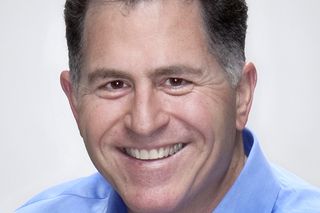Michael Dell: Back from the brink?
In late 2010, Michael Dell didn't have the full confidence of shareholders. Has he turned things around over the past year?

Just over a year ago, Michael Dell didn't have the full confidence of his company's shareholders.
A quarter of them withheld voting for the founder's re-election, as Mr Dell received less support than any other executive re-elected to the board.
The central issue facing the chairman and CEO was over a US Securities and Exchange Commission (SEC) investigation into how Mr Dell and his firm failed to adequately disclose information to shareholders over payments from Intel. The chip maker effectively paid Dell to keep using its processors, rather than switch to AMD.
The payments from Intel made it seem as though Dell was meeting or surpassing results expectations, the SEC said. Without them, however, the company would not have done so once between May 2001 and January 2006, the regulatory body claimed.
Dell was told to pay $100 million as part of the settlement, whilst the company founder personally paid out $4 million. It was not a pretty end to a murky story.
The legal investigation was not Dell's only problem. Some were calling for fresh blood, for a chief who could take Dell into a new era of IT in the cloud and thinner clients, as the desktop market falls.
This all came just after three years of Michael Dell's return as CEO of the company he founded, having stepped down in 2004.
Get the ITPro. daily newsletter
Receive our latest news, industry updates, featured resources and more. Sign up today to receive our FREE report on AI cyber crime & security - newly updated for 2024.
Like a nerdy kid hitting the gym in earnest, Dell has bulked up to become a full data centre solution company.
He has made some bold attempts to answer questions surrounding his ability to take Dell forward over the last year, however. He has re-envisioned his company, whilst keeping a firm grip on the client market, as others namely HP have chosen to move away.
Has the company-coined "new Dell" brought him back from the brink and secured his place as the leader of the business he created?
Welcome back
From the outside, it appears so. Dell has been a confident company of late.
Back in February, it posted some solid results, as its fourth quarter smashed Wall Street expectations. Many pointed to a Dell revival, as the company shifted into higher margin business, including a greater focus on servers, storage and services.
In August, the company again posted some decent figures as net income went up 63 per cent year-over-year. However, it reduced its revenue expectations for the year down to between one and five per cent. Yet it would be harsh to slam Dell for this mixed showing, given the entire market is being hit by reduced demand, added to the fact it is going through a major transitional period. We can forgive this faltering for now.
Highlighting its commitment to change, Dell has spent a penny or two. As part of its redefining of its business to focus on overall solutions, moving away from a hardware-centric model, Dell has bought a raft of companies.
The acquisition of Perot Systems for around $3.9 billion kicked off the spending spree in 2009, marking a notable moment in Dell's services commitment. Then came KACE Systems in 2010, providing hardware-based systems management appliances, followed by storage company Compellent, having missed out on 3PAR. Its latest move was to get hold of Force10 Networks to provide some prowess in the networking space. Like a nerdy kid hitting the gym in earnest, Dell has bulked up to become a full data centre solution company.
Tom Brewster is currently an associate editor at Forbes and an award-winning journalist who covers cyber security, surveillance, and privacy. Starting his career at ITPro as a staff writer and working up to a senior staff writer role, Tom has been covering the tech industry for more than ten years and is considered one of the leading journalists in his specialism.
He is a proud alum of the University of Sheffield where he secured an undergraduate degree in English Literature before undertaking a certification from General Assembly in web development.





